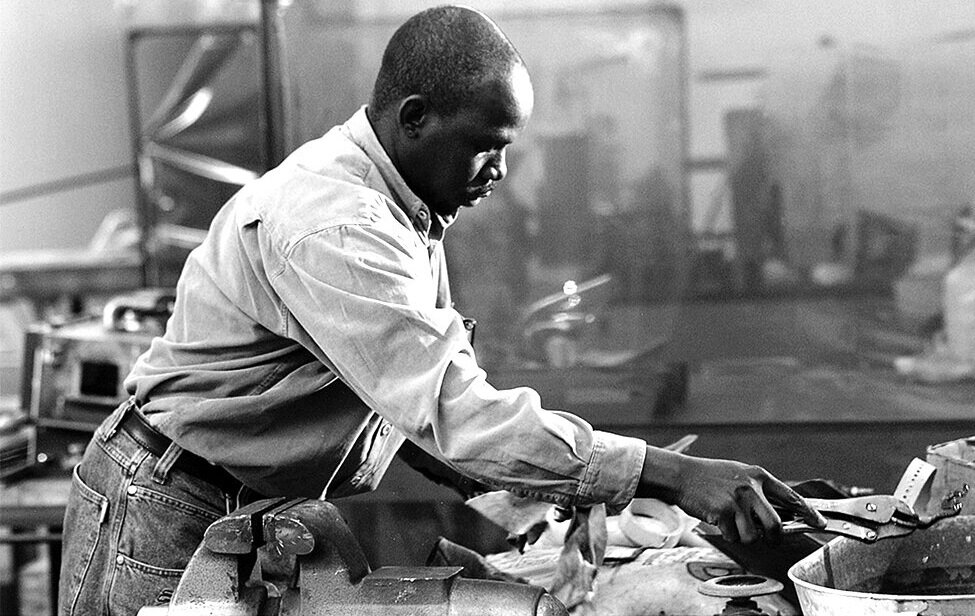
“Black Rein: An Imagery Journey by Karabo Mooki”

**Black Rein: A Photographic Odyssey by Karabo Mooki**
Art has always served as a means to delve into, interrogate, and reinterpret the multifaceted nature of human existence. In our modern era, the camera—as an extension of the creator’s perspective—holds remarkable possibilities for capturing cultural truths and reshaping narratives. One particularly impactful photographic journey is *Black Rein*, a moving collection from South African photographer Karabo Mooki.
### An Insight into Mooki’s Perspective
Karabo Mooki, a rising talent in the realm of photography, is celebrated for his capacity to capture the overlooked and undervalued facets of South African society. With *Black Rein*, Mooki illuminates a little-seen narrative: the lively yet neglected world of working-class equestrians in South Africa—specifically, Black horseback riders from township locales like Soweto.
Through personal portraits and spontaneous images, Mooki delves into themes of liberty, heritage, identity, and fervor. This series challenges established stereotypes regarding Black identity and conventional “Western” portrayals of equestrian culture. For Mooki, *Black Rein* is about reclaiming space and enhancing visibility for these riders while dismantling the Eurocentric misconception that horseback riding is a pursuit exclusive to the elite or predominantly white populations.
### Equestrians of Soweto: Riding Against Conformity
The riders featured in *Black Rein* hail mainly from Soweto, a location rich in the history of the struggle against apartheid and emblematic of community resilience and opposition. Yet, in the face of economic hardships, groups of horse riders converge to embrace a lifestyle that many might not associate with South African townships: the sport of horseback riding.
In these images, the subjects appear to find a harmonious blend of toughness and elegance, riding assuredly through dusty, urban settings or sharing tranquil moments with their horses in the shadow of the aging township architecture. The contrast of horses against this scene is striking—an artistically juxtaposed image that reflects the continuation of tradition in environments influenced by historical strife and current obstacles.
Through his lens, Mooki reveals a richer, more complex narrative surrounding South African township life. By capturing these equestrians, he honors their resilience, commitment, and deep-rooted affinity with horses, presenting a counter-narrative that defies societal categorizations of race, class, and culture.
### A Reclamation of Ownership
Mooki’s work resonates profoundly due to its emphasis on the amalgamation of self-discovery, defiance, and identity. The Black riders in his photographs assert their agency—not solely through their physical presence on horseback, but also via their determination, steadfastness, and genuine joy. In this context, horseback riding transcends being just a sport; it embodies a deep bond between humans and their horses, serving as a form of resistance against limitations imposed by societal expectations.
Each portrait in *Black Rein* feels deliberate, pushing the viewer to reconsider their assumptions about who engages in equestrian culture and what that involvement conveys about South Africa’s intricate social fabric. The riders exude regality, pride, and grounding, demonstrating not only an acceptance of a subculture but also broadening the understanding of Black identity in a post-apartheid sociopolitical landscape.
For Mooki, this project rests on both personal and documentary grounds. The photographer’s work frequently acts as a platform for his exploration of his identity as a young Black South African. In this regard, *Black Rein* also mirrors how traditional cultural practices—whether widely accepted or niche—can be embraced and expressed by anyone, regardless of origins or status.
### Stylistic and Aesthetic Resonance
A particularly intriguing aspect of *Black Rein* is Mooki’s visual approach. His utilization of natural light and earthy tones imbues each image with warmth, while the textured grain and subtle hues foster an almost ethereal ambiance. This unique aesthetic strikes a careful balance between the rawness of urban existence and the understated sophistication of equestrian sport.
The horses themselves form a crucial visual element within the collection, their presence exemplifying the complexity of the riders. Their robust physiques and natural poise represent endurance, while the relationship between rider and horse serves as a potent metaphor for navigating balance amidst systemic adversities.
Mooki is not merely chronicling events—he crafts narratives that capture moments of humanity often missed by the mainstream. His artistry lies in inviting viewers to notice the finer details: the gentle stroke of a hand on a horse’s mane, a child’s wide-eyed admiration for a rider seen through a fence, or the beads of sweat gracing a rider’s forehead. These image-rich moments express a symbiotic connection between human and horse that transcends the act of riding; it represents a mode of self-discovery and emancipation in a country marked by economic challenges.
### Broadening the Conversation
*Black Rein*